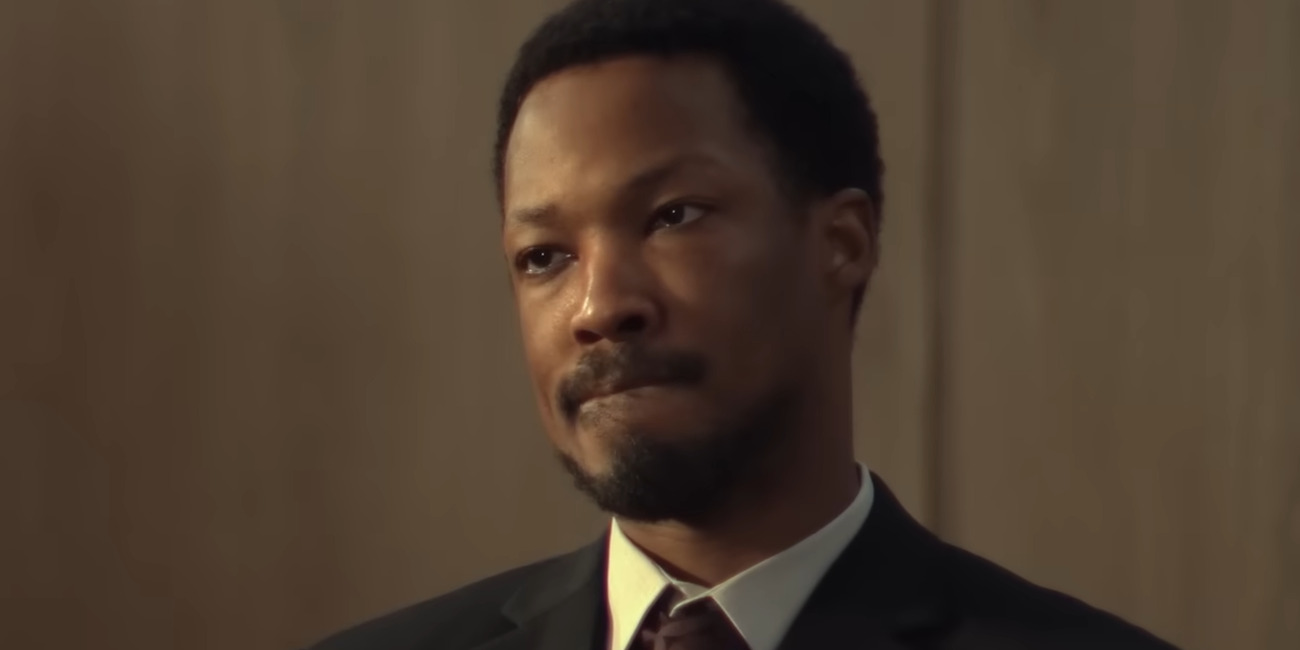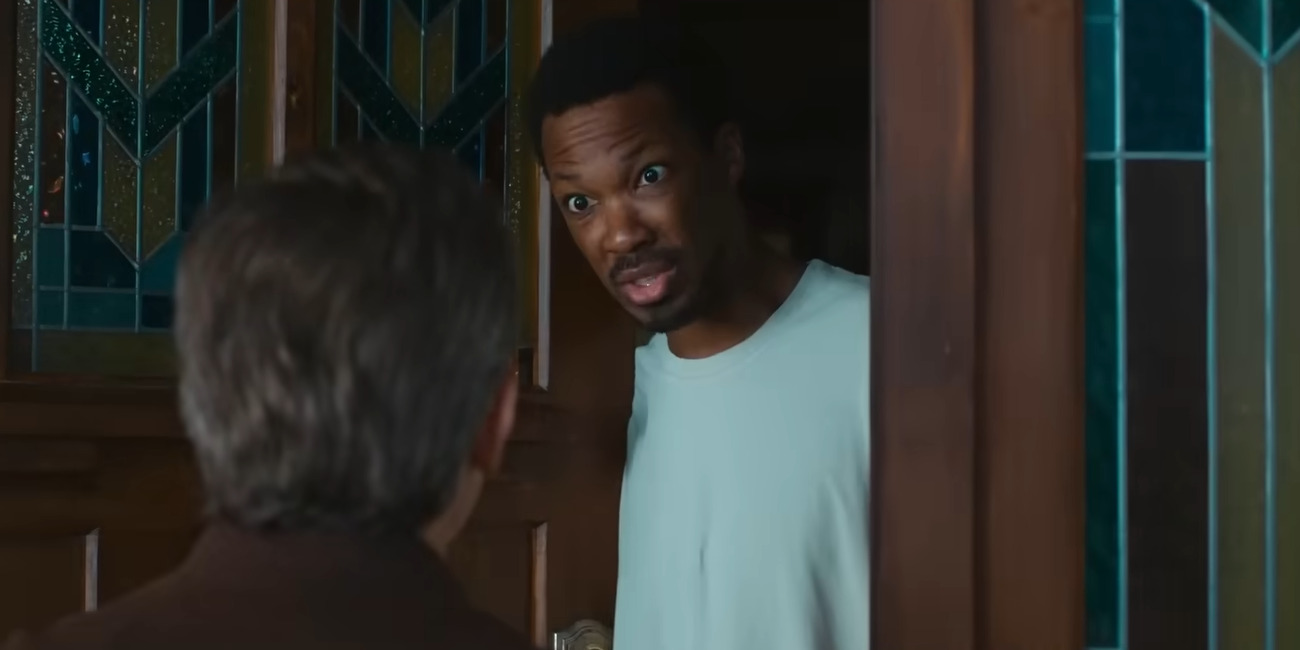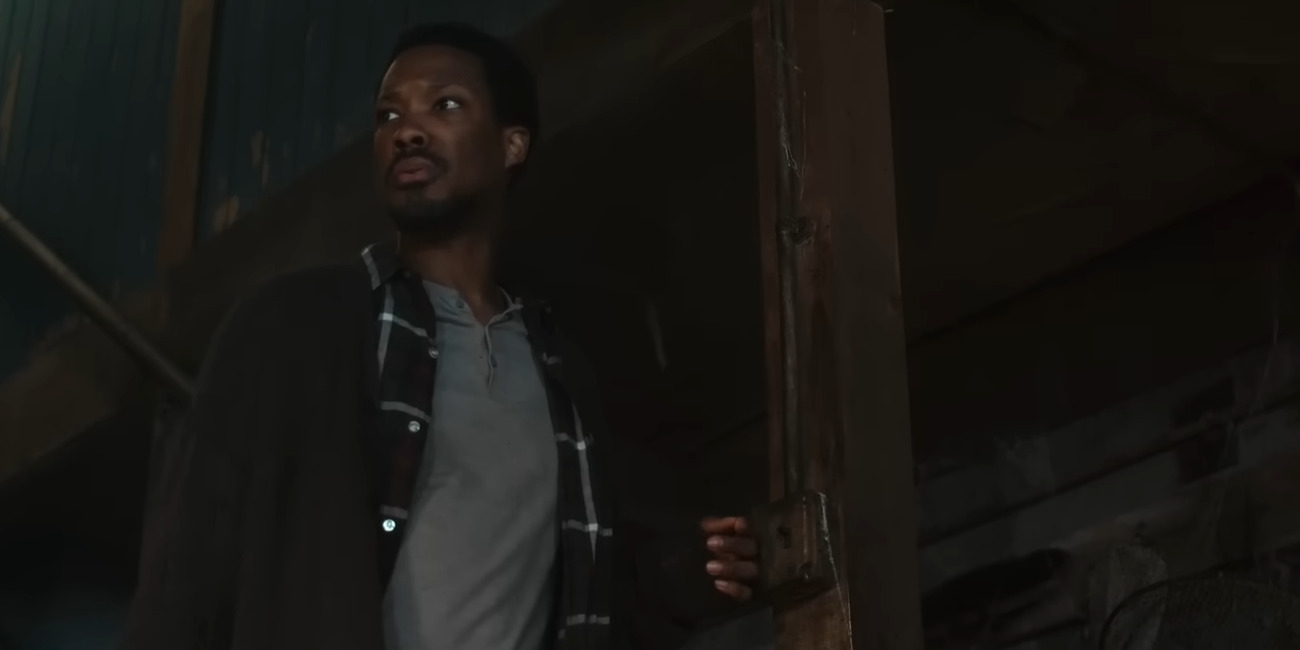Nadia Latif’s ‘The Man in My Basement’ is a psychological thriller film with a house at the narrative center that is haunted in the most unexpected ways. The protagonist, Charles Blakey, is a young man who is passing through life without any prospects, aimless and penniless. His place of residence, his mother’s generational home in SAG Harbor Hills, remains the anchor that keeps him tied to a monotonous life that threatens to come undone in the face of financial ruin. Therefore, when a rich man named Anniston Bennet knocks on his door with an intriguing proposition, 65 thousand dollars for renting out two months in his basement, the homeowner has no choice but to take the deal.
However, on the first day of the older gentleman’s lodging, Charles uncovers a horrid reality. Bennet has built a prison cell for himself in the basement, where he intends to live out the coming weeks with the younger man as his jailor. What follows is a study into themes of guilt, grief, and power dynamics built around race and wealth. The two men’s time together takes increasingly disconcerting turns, yet their conclusion remains even more intriguing. SPOILERS AHEAD!
The Man in My Basement Plot Synopsis
Charles Blakey is stuck in his hometown, without a job, and living in a house that the bank is threatening to foreclose on. His misery is evident in the way he needlessly picks fights with even his closest friends, Ricky and Clarence. Still, when Anniston Bennet shows up on his doorstep enquiring about renting opportunities for his basement, he initially turns him down. However, once the bank puts more pressure on him after receiving an offer on the house, the young man is backed into an impossible corner. Thus, accepting the possibility of renting out his basement, he invites Ricky over to clean out the space currently being used for storing family heirlooms. While he wants to torch the entire lot, his friend advises him to consult an antique specialist, Narciss, who could probably get him a good deal on the furniture. Nonetheless, when she arrives for an evaluation, she realizes that the place houses generations of antique furniture and a set of exceptionally special masks.

Although Narciss is more intrigued by the heirlooms’ historical and cultural significance, Charles’ interest remains financially driven. The next day, he receives a call from Bennet and makes a startling revelation about just how much cash the latter is willing to spend on this endeavor. The other man promises to pay Charles 65 thousand dollars cash in installments. All he requires from him in preparation is his discretion and a ride from the airport. Soon enough, he finds himself with a wealthy stranger in his basement, who arrives with nothing but a small suitcase and a few boxes delivered earlier. The two make some small talk, in which Bennet establishes himself as a businessman who works in the vague business of reclamation. Although Charles doesn’t think too much of the entire ordeal at first, he finds himself in for an unnerving surprise when he goes down the next morning with breakfast for his lodger.
As it turns out, Bennet has constructed a cage for himself overnight, and he intends to live out the following two months inside as a prisoner. Worse yet, he wants the younger man to hold onto the lone key, deliver him food, and deal with the place’s casual upkeep. Initially, the homeowner is troubled, but he folds at the prospect of more financial compensation. Nonetheless, in the following days, the arrangement begins to weigh heavily on him. He tries to learn more about his renter to get an idea of his motives. Soon enough, he resorts to simply asking the man directly. Bennet speaks about spiritual journeys, framing this self-imposed imprisonment as an exercise in isolation and seclusion. Yet, it remains evident that the wealthy man is hiding some dark skeletons in his closet. Furthermore, his presence in the house, even if only in the basement, seems to have a peculiar effect on Charles, whose anxiety and paranoia skyrocket for no apparent reason.
One night, when his deteriorating condition brings him near a suicide attempt, Charles makes up his mind and confronts Bennet, insisting he take his leave. In turn, the man reveals part of the real reason for his self-imprisonment. Despite his confession, it remains evident that the older man is still hiding something. Moreover, the things he reveals aggravate Charles, compelling him to step into the role of an actual warden with a prisoner. Thus, the next few days remain brutal with the latter withholding things like water, food, and even light from the caged man as privileges that have to be earned by exchanging information about his personal life. In the end, their game reaches an unnerving conclusion with both men nearly driven mad by the roles they have imposed upon themselves.
The Man in My Basement Ending: Is Bennett Dead? How Did He Die?
Once more of Bennet’s past begins to come out in the open, his dynamic with Charles becomes all the more strained. Initially, the latter only plays the part of a reluctant warden. He keeps the other man fed, and their relationship remains amicable. Nonetheless, his presence lingers like a dark shadow on his mind. Eventually, this results in a confrontation wherein the wealthy man tells a story of executing someone under his employer’s command. The person he killed, much like Charles, was a Black man. This only sparks further anger in the homeowner, which compels Bennet to reveal that he has done extensive research on his past. In fact, he was the one who pushed the bank to foreclose on his house to push him to accept his offer.

This becomes the breaking point, which pushes the younger man to gradually step into his role as a jailor. Once Charles begins withholding even something as basic as light from Bennet, it casts the latter’s life in a literal darkness. Locked inside the freezing, dark basement with nothing but his thoughts to accompany him, the worst of his memories come back to haunt him. He finds himself inadvertently facing ghosts of his past, the same ones that had pushed him to undertake this intense exercise in the first place. Now, his isolation becomes truly real without any holds barred. The psychological torment this brings him remains greater than any of the darkness Bennet has ever experienced in his life.
In the aftermath, once Charles takes pity on his prisoner and restores some of the dignity in his entrapment, the caged man is given an opportunity to reckon with the intensity of the last few days. From there, the two men are able to reconvene toward something that resembles civility a little more. Both share some of the worst of their secrets, unearthing the darkest parts of themselves to each other. This confessional exercise acts as a cathartic outlet. Unsurprisingly, after this exchange, when Charles visits the man in his basement the next morning, he only finds a dead body and a note. As it turns out, Benett had been planning on dying ever since he arrived on the property. For the same reason, he brought a couple of pills with him that can instantly deliver him to a swift and painless death. All along, he was waiting to find some obscure answer about his existence, to make some peace with his past, before he could inevitably embrace his demise. In the end, it’s not ancient books or Herman Melville that deliver him to this enlightenment, but rather Charles’ corrupted cruelty. Once he reckons with his own past, he is finally able to end his life.
Why Did Bennett Rent Charles’ Basement?
In many ways, Bennet’s motives and their invisible connection to Charles remain at the center of the narrative throughout the show. Why does the wealthy man crave imprisonment, and more importantly, why does he choose the protagonist to dole it out? As the former chooses his death before his time comes, he takes a lot of his reasons with him as secrets that will forever remain buried. Still, some pieces of the puzzle become visible through his and Charles’ interaction throughout the time of his entrapment. First, Bennet admits to the cold-blooded execution of a Black man at the simple demand of his superiors. At the time of confession, he denies the charge of murder, insisting that he was simply doing his job. He believes that if he hadn’t committed the act of cruelty, someone else would have.

Later, Bennet reveals multiple other stories that paint a similar picture. His business of reclamation is actually a thinly veiled excuse for being at the beck and call of the worst that humanity has to offer. He has tortured men and killed their families simply to prove a point. One of the worst things he remembers doing is buying a baby from a desperate mother who had 13 other mouths to feed. Afterward, he left that baby, a nine-month-old girl, at the mercy of a dog just because the latter’s master wanted to evaluate the true beastly nature of his god. It’s that memory more than anything that haunts Benett. Although he never says it outright, it’s implied that many of these atrocities were possibly committed on people of color at the behest of white employers. Simultaneously, alongside these horrifying acts of brutality that made Bennet his considerable fortune, another part of him exists.
The man who showed up at Charles’ door wasn’t always the wealthy Anniston Bennet. Instead, he was born Tamal Knosos, son of a Greek woman and a father who remained forever unidentified. Since his mother died before she could name him, he got his name as a combination of his parents: Knosos for his mother’s last name and Tamal for his father’s first name. From then on, he lived his life in pursuit of wealth and power, which inevitably led him down a horrifying road. Although he refused to let guilt cloud his judgment during those days, it comes back to haunt him in his old age when he has grown rich and comfortable. As such, in an effort to make peace with his crimes, he convinces himself that he needs to do penance as a prisoner at the mercy of a Black master. Charles, a lonely man with no family left and a mounting debt to his name, simply made the perfect puppet for the job. In the end, the younger man comes to the same realization, understanding that, regardless of Bennet’s talks of guilt, he chose to exploit and abuse Charles in a twisted attempt to clear his own conscience. Perhaps, for the same reason, he burns the dead man’s letters for his friends and families, refusing to play his game any longer.
Does Charles Lose the House? Why Did He Never Leave?
Even though Charles isn’t a literal prisoner in the Bakley house, his presence in it remains almost as puzzling as Bennet’s. During his past employment at the local bank, he took a little over four hundred dollars from his drawer, which earned him the charge of petty embezzlement. As a result, his former employer poisoned the town against him, making it difficult for him to find a job. In turn, his financial instability impacts his inability to maintain the upkeep on the mortgage on his mother’s house. Therefore, he’s stuck in a spiral that only goes down and down. As many of his friends point out, it would simply be better for him to escape the small town at that point. If Charles leaves SAG, he can put his college education to use and have a fresh start. Yet, he remains tethered to the house.

The reason behind Charles’ toxic attachment to the Blackey house is, in part, because of the same reason that keeps him on edge throughout Bennet’s stay inside his basement. Having the older man in his basement reminds him of a time in his life when he was tethered to another occupant of the place: Brent. However, while his past trauma and mistakes keep him rooted in his family’s house, it’s also his heritage that prevents him from growing. Charles initially returned to the house to take care of his ailing mother before he was roped into looking after Brent as well. In many ways, the ghost of his mother and her love also keep him rooted in the place, unable to simply let it go. This is reminiscent of his relationship with the masks that he finds in his basement.
Off-the-bat, Charles is only interested in selling the artifacts and making a quick buck from them. Although it takes some time, Narciss manages to make him see the value in preserving his heritage. As an antique expert, she is interested in unearthing the reality of her ancestors, the first of the African-Americans, outside of the horrifying transatlantic slave trade. Charles’ house and its rich history add substantial weight to her argument. For the same reason, she pitches the idea of turning the house into a museum so that the homeowner can capitalize on the artifacts without displacing them from their true home and history. The bigger picture isn’t as significant to Charles as it is to Narciss. Still, the idea of turning the place into a museum serves the part of him that holds on to the house because of his mother. Thus, he ultimately agrees to the same arrangement. Yet, even after the house becomes a symbol of something bigger and purer than its darkest memories, Charles remains haunted by them, as evidenced by his presence inside Benett’s cage.
Who is Brent? How Did He Die?
Brent plays a notable role in Charles’ story as the root of his trauma inside the Blakey house. He was the latter’s uncle, who came to live with the family while the younger man was away at college. The two never had a good relationship, and it is implied that Charles was abused by his uncle to the point of being afraid of him at a young age. For the same reason, he came to detest the older man as the years went on. Eventually, after his father’s death, his mother grew sick, which brought him back to the Blakey house. However, shortly after his arrival, his mother passed away. In the aftermath, Charles was left to become the caretaker of his uncle, whom he hated with a passion.

As such, soon enough, Charles began to neglect his caretaking duties. In his old age, unable to move and look after himself, Brent could only call out for his nephew’s help. Nonetheless, the calls turned to screams, and no help ever came. In time, the screams stopped, and Brent passed away under the weight of Charles’ intentional negligence. Even though the latter made the decisions in the moment, he came to regret them in the aftermath. The cost of killing a man caught up to him, compelling him to become frozen. As a result, he became unable to leave the Blakey house, the scene of the crime and the monument to his sin. Later, the ghost of Brent’s memory contributed to Charles’ paranoia around Bennet since the latter was inadvertently recreating the suffocating moment from the younger man’s life.


